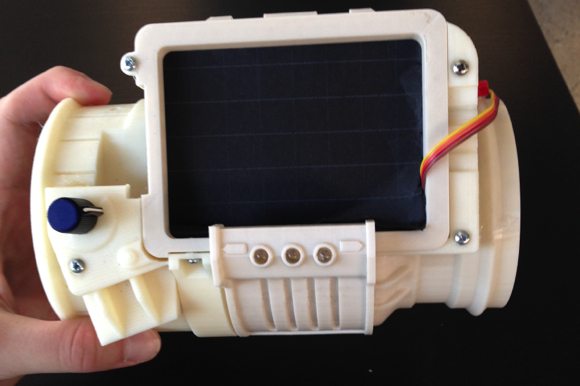
Wrist Computer Inspired by Video Game
The Pip-Boy 3000 is a wearable wrist computer that looks like it came straight out of a video game, and in fact, it did. The device was inspired by the Fallout series of video games. A team of Reno Hackers—Ashley Hennefer, Colin Loretz, Christopher Baker, Andrew Warren and Ben Hammel—created the cuff device for NASA’s space wearables competition, part of the International Space Apps Challenge 48-hour hackathon.
The computer uses an iOS app to display maps and environmental data, such as air pressure, humidity, altitude, temperature and radiation levels. The Pip-Boy 3000 was created using a range of components, including a Texas Instruments BLE4 sensor tag, an iPhone5 and a Pinoccio microcontroller. The team is working on a more advanced model, which will include EEG, a heart rate monitor and a communications system.
3-D Printing Helps Sudan War Victims
Mick Ebeling, founder of Not Impossible Labs, has created a simple prosthetic arm, designed to help victims of the war in Sudan. The prosthetic is made using plastic, spring a computer and a 3-D printer. Ebeling took the materials to the Sudan, where he created an artificial limb for Sudanese Daniel Omar who lost both his arms in a Sudanese government airstrike two years ago.
There are an estimated 50,000 amputees in South Sudan. Not Impossible Labs intend to help the local people recover from the ongoing conflicts. “It’s really about the concept of help one, help many,” says Ebeling in an interview with Fast Company. “If I had read the article and thought, ‘I gotta go help the amputees!’ There’s really no place to start. It’s like Bill Gates trying to fight malaria or Bono fighting poverty. But by breaking it down to one individual – I want to help Daniel – then it becomes an achievable end goal, one person helping one person.
A Helmet to Protect from Depression
Israeli company Brainsway recently developed a device that may provide relief to individuals suffering from a variety of psychiatric conditions, including Alzheimer’s disease and depression. The device is comprised of a helmet that transmits pulses — using transcranial magnetic stimulation — to the brain to improve functioning in certain areas.
According to Brainsway Chief Technology officer Ronen Segal, the technology is able to penetrate much deeper than any existing non-invasive methods. He also claims that the electromagnetic waves produced by the helmet are able to target areas of the brain that were previously unreachable.







